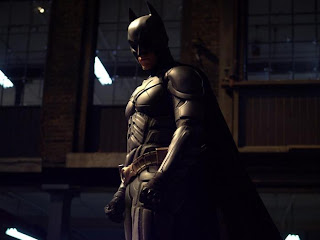Superheroes — Humanistic Hope
"Don't talk like one of them. You're not! Even if you'd like to be. To them, you're just a freak, like me! They need you right now, but when they don't, they'll cast you out, like a leper! You see, their morals, their code, it's a bad joke. Dropped at the first sign of trouble. They're only as good as the world allows them to be. I'll show you. When the chips are down, these... these civilized people, they'll eat each other. See, I'm not a monster. I'm just ahead of the curve." — The Joker, "The Dark Knight"
When "Entertainment Weekly" allowed America to vote on the greatest comic book superhero of all time, there was really no doubt who would win. It was Batman, and it wasn't even close. So it feels fitting to me to end this mini blog series with Batman.
It feels fitting for a couple reasons. First, Batman has to be the most popular superhero of all time. I voted for him to be No. 1 because Batman is, and always has been, my favorite superhero. Also, it's hard to deny that "The Dark Knight" in particular, and Christopher Nolan's Batman trilogy in general, represent the best of superhero movies that have been made in America. That is saying something since this is a nation obsessed with comic book heroes.
But that, too, makes sense. Batman has been the most popular because he probably most closely represents the American ethic of what a hero could and should be. He is a man. He does not have superpowers. He is just a man who uses his fabulous wealth to make the world a better place. At our core, as a society, we like to believe we are altruistic and capable of making the world the place we want it to be. Batman represents the ethic of humanism.
"The Dark Knight" is an opus to this line of thinking. I love the movie, I think it was the best film of the first decade of the 21st Century, but I struggle with the ideology. Christopher Nolan, who is British, is clearly a humanist. In a lot of ways, his Batman films try to offer a way to see hope for humanity given the depravity of the world with the idea there is no God. The film is about the importance of hope, and how we fool ourselves into deriving that hope despite all the evidence to the contrary.
I used to think that Nolan actually believed we can make our own hope, and I still think he wants to believe it, but I see the presence of truth and doubt throughout the film — just not where you'd expect.
I love the dichotomy between Batman and The Joker in "The Dark Knight." You see that in the scene where the two men face off in the interrogation room. I don’t think their goals or motives are the same, but I think Batman and The Joker are opposite sides of the same coin. The Joker is an anarchist. Batman is a vigilante. A pure anarchist doesn’t believe in any one or anything. They seek to destroy the natural order and create chaos, marching to the beat of their own drum. The flip side of that is vigilantism. A vigilante believes so strongly in the rule of order that he or she actually breaks the law and operates outside the law to uphold that ideal. Vigilantism is an opposite response, but still a response to the problem of evil in the world. The Joker believes in no one and nothing, Batman believes so strongly in the rule of law he personally fights to protect it. In that way, he also falls short of the Biblical mandate to honor those in authority. The paradox is that in an effort to uphold order he actually defies it.
That is actually why Batman felt he needed Harvey Dent, because he believed too greatly in his own boundaries that he couldn’t do all that was needed to protect the city. In that way he stops short of pure vigilantism, because I think a pure vigilante would kill those he believed did wrong because he would consider it a fulfillment of the law.
I also think this conversation begins to frame the difference in the way Batman and The Joker see human nature. This is a question that we all struggle with I think. The debate is whether we are, at heart, inherently good or evil in our basic human nature. Batman believes men are good, or want to be good. You see that in “Batman Begins,” when he faces off against Liam Neeson. He says there are good people and Gotham is still worth saving, drawing a parallel to the plea Lot made to save Sodom and Gomorrah. The Joker believes that the nature of man is evil. He says as much to Batman when he says people’s morals are “like a bad joke, dropped at the first sign of trouble.”
That is also what makes the ending of the film a beautiful tragedy. Batman sacrifices himself to preserve a false hope for the people because, though Nolan understands the true nature of man, as someone who doesn't believe in God he just can't go there. It's understandable, because if you did go there you'd end up with a view as nihilistic as the one featured in "Watchmen."
I love Batman, I love the Batman films, and I think that, philosophically, it represents the ideology of our country in 2012. It's that last part that I find most troubling.




Comments
Post a Comment